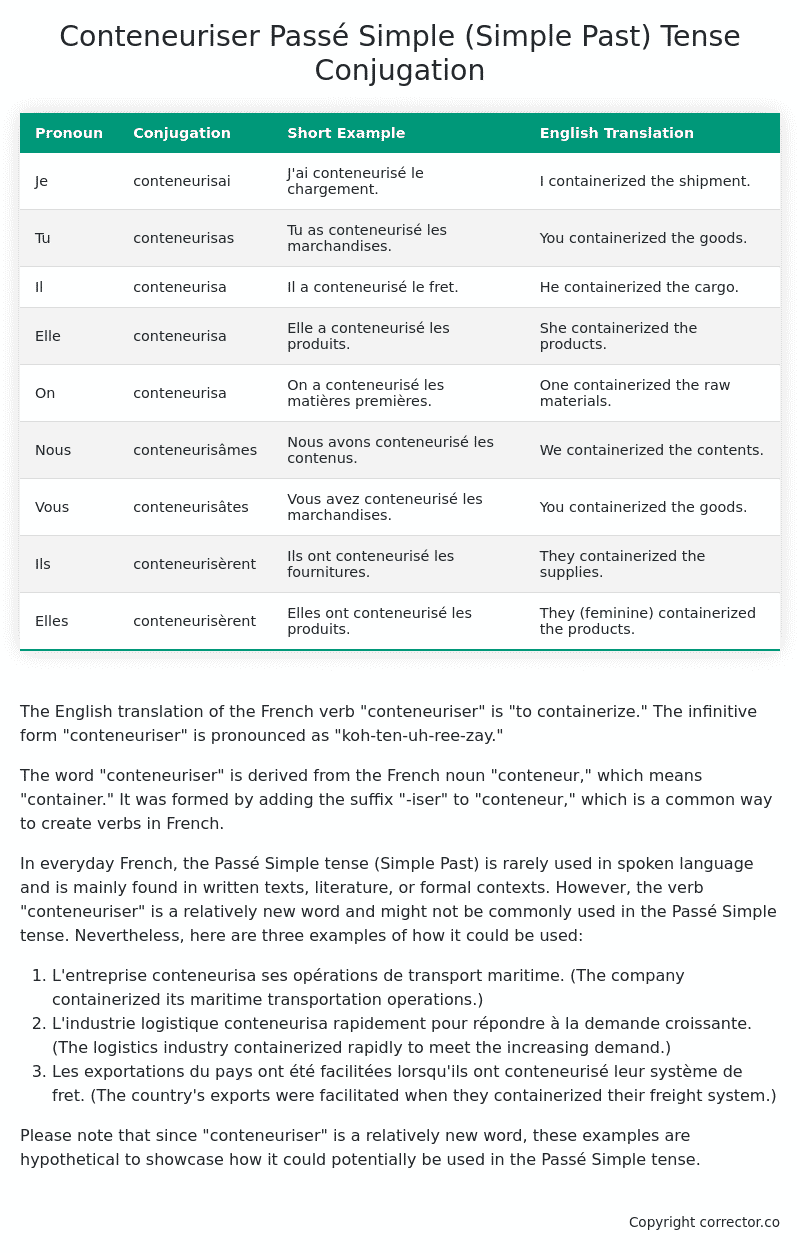Passé Simple (Simple Past) Tense Conjugation of the French Verb conteneuriser
Introduction to the verb conteneuriser
The English translation of the French verb “conteneuriser” is “to containerize.” The infinitive form “conteneuriser” is pronounced as “koh-ten-uh-ree-zay.”
The word “conteneuriser” is derived from the French noun “conteneur,” which means “container.” It was formed by adding the suffix “-iser” to “conteneur,” which is a common way to create verbs in French.
In everyday French, the Passé Simple tense (Simple Past) is rarely used in spoken language and is mainly found in written texts, literature, or formal contexts. However, the verb “conteneuriser” is a relatively new word and might not be commonly used in the Passé Simple tense. Nevertheless, here are three examples of how it could be used:
- L’entreprise conteneurisa ses opérations de transport maritime. (The company containerized its maritime transportation operations.)
- L’industrie logistique conteneurisa rapidement pour répondre à la demande croissante. (The logistics industry containerized rapidly to meet the increasing demand.)
- Les exportations du pays ont été facilitées lorsqu’ils ont conteneurisé leur système de fret. (The country’s exports were facilitated when they containerized their freight system.)
Please note that since “conteneuriser” is a relatively new word, these examples are hypothetical to showcase how it could potentially be used in the Passé Simple tense.
Table of the Passé Simple (Simple Past) Tense Conjugation of conteneuriser
| Pronoun | Conjugation | Short Example | English Translation |
|---|---|---|---|
| Je | conteneurisai | J’ai conteneurisé le chargement. | I containerized the shipment. |
| Tu | conteneurisas | Tu as conteneurisé les marchandises. | You containerized the goods. |
| Il | conteneurisa | Il a conteneurisé le fret. | He containerized the cargo. |
| Elle | conteneurisa | Elle a conteneurisé les produits. | She containerized the products. |
| On | conteneurisa | On a conteneurisé les matières premières. | One containerized the raw materials. |
| Nous | conteneurisâmes | Nous avons conteneurisé les contenus. | We containerized the contents. |
| Vous | conteneurisâtes | Vous avez conteneurisé les marchandises. | You containerized the goods. |
| Ils | conteneurisèrent | Ils ont conteneurisé les fournitures. | They containerized the supplies. |
| Elles | conteneurisèrent | Elles ont conteneurisé les produits. | They (feminine) containerized the products. |
Other Conjugations for Conteneuriser.
Le Present (Present Tense) Conjugation of the French Verb conteneuriser
Imparfait (Imperfect) Tense Conjugation of the French Verb conteneuriser
Passé Simple (Simple Past) Tense Conjugation of the French Verb conteneuriser (You’re reading it right now!)
Passé Composé (Present Perfect) Tense Conjugation of the French Verb conteneuriser
Futur Simple (Simple Future) Tense Conjugation of the French Verb conteneuriser
Futur Proche (Near Future) Tense Conjugation of the French Verb conteneuriser
Plus-que-parfait (Pluperfect) Tense Conjugation of the French Verb conteneuriser
Passé Antérieur (Past Anterior) Tense Conjugation of the French Verb conteneuriser
Futur Antérieur (Future Anterior) Tense Conjugation of the French Verb conteneuriser
Subjonctif Présent (Subjunctive Present) Tense Conjugation of the French Verb conteneuriser
Subjonctif Passé (Subjunctive Past) Tense Conjugation of the French Verb conteneuriser
Subjonctif Imparfait (Subjunctive Imperfect) Tense Conjugation of the French Verb conteneuriser
Conditionnel Présent (Conditional Present) Tense Conjugation of the French Verb conteneuriser
Conditionnel Passé (Conditional Past) Tense Conjugation of the French Verb conteneuriser
Conditionnel Passé II (Conditional Past II) Tense Conjugation of the French Verb conteneuriser
L’impératif Présent (Imperative Present) Tense Conjugation of the French Verb conteneuriser
L’impératif Passé (Imperative Past) Tense Conjugation of the French Verb conteneuriser
L’infinitif Présent (Infinitive Present) Tense Conjugation of the French Verb conteneuriser
L’infinitif Passé (Infinitive Past) Tense Conjugation of the French Verb conteneuriser
Le Participe Présent (Present Participle) Tense Conjugation of the French Verb conteneuriser
Le Participe Passé (Past Participle) Tense Conjugation of the French Verb conteneuriser
Struggling with French verbs or the language in general? Why not use our free French Grammar Checker – no registration required!
Get a FREE Download Study Sheet of this Conjugation 🔥
Simply right click the image below, click “save image” and get your free reference for the conteneuriser Passé Simple tense conjugation!

Conteneuriser – About the French Passé Simple (Simple Past) Tense
Formation
Usage
Narration
Historical Context
Interactions with other tenses
Passé Composé
Imparfait
Conditional and Subjunctive
Summary
I hope you enjoyed this article on the verb conteneuriser. Still in a learning mood? Check out another TOTALLY random French verb conjugation!


